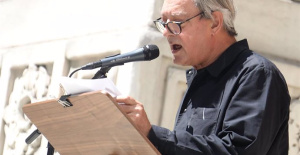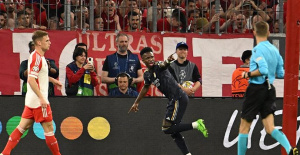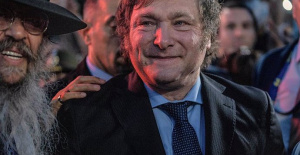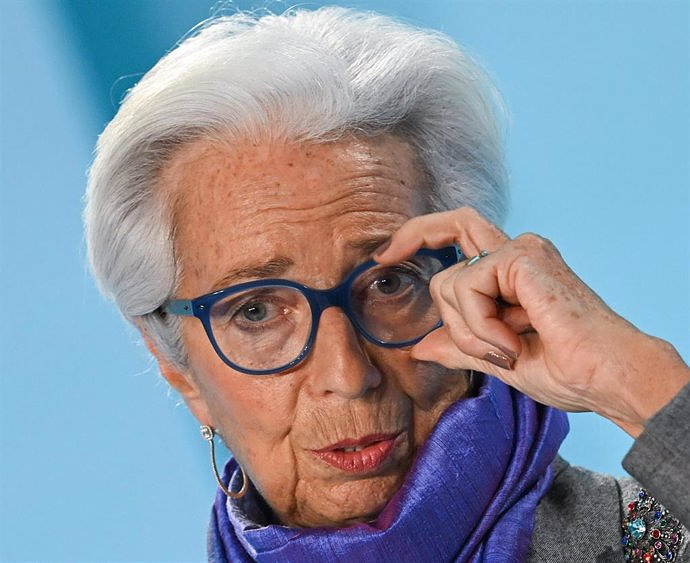Aznar and Rajoy agree on the importance of the Alliance looking to the south and the threats coming from Africa
MADRID, 30 May. (EUROPA PRESS) -
Former Prime Minister Felipe González believes that, 40 years after joining NATO, there is a "return to looking at the navel" and "withdrawing" in society, showing interest only in what is happening in Spain.
This phenomenon is manifested above all among those under 45 years of age, who are the ones who show "least interest" in the Atlantic Alliance, according to González in an article published by the Elcano Royal Institute as part of a special for the anniversary of the entry of Spain in the international organization.
The work has the contribution of the President of the Government, Pedro Sánchez; all his predecessors in the Executive; the Foreign Minister, José Manuel Albares; Defense, Margarita Robles; and his predecessors in the Department; in addition to other protagonists and international leaders.
In his article, González asserts that Spain's entry into the Atlantic Alliance changed the perspective of the Armed Forces, causing them to "stop looking at the internal enemy and begin to contemplate a European and international horizon".
"Now it seems that there is a return to looking at the navel, to retreat, showing interest only in what is happening in Spain --he laments--. Despite the fact that today there is wide support for NATO and its membership, they are the youngest , those under 45, those who seem to show less interest.
Instead, he claims that the president of Russia, Vladimir Putin, has demonstrated the "usefulness" of NATO and shown that it is a "necessary instrument", "at least to limit his imperialist desires and reduce them to his sphere of sovereignty".
In this regard, Aznar reviews Spain's accession to the NATO integrated military structure that took place during his mandate and that allowed Spain access to positions of responsibility and recalls that one of Spain's efforts has always been the recognition of existing risks in North Africa. "A look to the south that in no way detracts from what NATO can and must do to guarantee the stability and security of allies in the east," he explains.
Mariano Rajoy agrees with him, who assures that this was precisely one of his greatest "endeavours" during his years in office, with the aim that "attention towards eastern Europe would not be to the detriment of the southern flank".
José Luis Rodríguez Zapatero, for his part, explains his "desire for dialogue and availability" from the Palacio de la Moncloa in favor of NATO, which recognizes that it is currently at a "difficult crossroads".
In his opinion, after "the failure" of Afghanistan and the war in Ukraine, it is necessary to reconfigure a global security scheme that "should be anchored in the United Nations and in which NATO must continue to play its role as a transatlantic alliance."

 Exploring Cardano: Inner Workings and Advantages of this Cryptocurrency
Exploring Cardano: Inner Workings and Advantages of this Cryptocurrency Seville.- Economy.- Innova.- STSA inaugurates its new painting and sealing hangar in San Pablo, for 18 million
Seville.- Economy.- Innova.- STSA inaugurates its new painting and sealing hangar in San Pablo, for 18 million Innova.- More than 300 volunteers join the Andalucía Compromiso Digital network in one month to facilitate access to ICT
Innova.- More than 300 volunteers join the Andalucía Compromiso Digital network in one month to facilitate access to ICT Innova.-AMP.- Ayesa acquires 51% of Sadiel, which will create new technological engineering products and expand markets
Innova.-AMP.- Ayesa acquires 51% of Sadiel, which will create new technological engineering products and expand markets Prominent American writer Paul Auster dies at 77 from lung cancer
Prominent American writer Paul Auster dies at 77 from lung cancer RELEASE: Rendeavor Expands High-Speed Internet Access to Local Communities Around Tatu, Kenya
RELEASE: Rendeavor Expands High-Speed Internet Access to Local Communities Around Tatu, Kenya Real Madrid saves a draw in Munich and will appeal again to the Bernabéu
Real Madrid saves a draw in Munich and will appeal again to the Bernabéu The Congress of Argentina approves the omnibus law that allows the privatization of some public companies
The Congress of Argentina approves the omnibus law that allows the privatization of some public companies How Blockchain in being used to shape the future
How Blockchain in being used to shape the future Not just BTC and ETH: Here Are Some More Interesting Coins Worth Focusing on
Not just BTC and ETH: Here Are Some More Interesting Coins Worth Focusing on Valencia unanimously approves the ordinance to allocate spaces to test innovative initiatives
Valencia unanimously approves the ordinance to allocate spaces to test innovative initiatives UPV researchers promote a paid master's degree as a "talent factory" in integrated photonics
UPV researchers promote a paid master's degree as a "talent factory" in integrated photonics A spin-off of the UV works on obtaining high-resolution 3D biomedical images in real time
A spin-off of the UV works on obtaining high-resolution 3D biomedical images in real time They create a bank of machinery sounds to prevent breakdowns through artificial intelligence
They create a bank of machinery sounds to prevent breakdowns through artificial intelligence A million people demonstrate in France against Macron's pension reform
A million people demonstrate in France against Macron's pension reform Russia launches several missiles against "critical infrastructure" in the city of Zaporizhia
Russia launches several missiles against "critical infrastructure" in the city of Zaporizhia A "procession" remembers the dead of the Calabria shipwreck as bodies continue to wash up on the shore
A "procession" remembers the dead of the Calabria shipwreck as bodies continue to wash up on the shore Prison sentences handed down for three prominent Hong Kong pro-democracy activists
Prison sentences handed down for three prominent Hong Kong pro-democracy activists ETH continues to leave trading platforms, Ethereum balance on exchanges lowest in 3 years
ETH continues to leave trading platforms, Ethereum balance on exchanges lowest in 3 years Investors invest $450 million in Consensys, Ethereum incubator now valued at $7 billion
Investors invest $450 million in Consensys, Ethereum incubator now valued at $7 billion Alchemy Integrates Ethereum L2 Product Starknet to Enhance Web3 Scalability at a Price 100x Lower Than L1 Fees
Alchemy Integrates Ethereum L2 Product Starknet to Enhance Web3 Scalability at a Price 100x Lower Than L1 Fees Mining Report: Bitcoin's Electricity Consumption Declines by 25% in Q1 2022
Mining Report: Bitcoin's Electricity Consumption Declines by 25% in Q1 2022 Oil-to-Bitcoin Mining Firm Crusoe Energy Systems Raised $505 Million
Oil-to-Bitcoin Mining Firm Crusoe Energy Systems Raised $505 Million Microbt reveals the latest Bitcoin mining rigs -- Machines produce up to 126 TH/s with custom 5nm chip design
Microbt reveals the latest Bitcoin mining rigs -- Machines produce up to 126 TH/s with custom 5nm chip design Bitcoin's Mining Difficulty Hits a Lifetime High, With More Than 90% of BTC Supply Issued
Bitcoin's Mining Difficulty Hits a Lifetime High, With More Than 90% of BTC Supply Issued The Biggest Movers are Near, EOS, and RUNE during Friday's Selloff
The Biggest Movers are Near, EOS, and RUNE during Friday's Selloff Global Markets Spooked by a Hawkish Fed and Covid, Stocks and Crypto Gain After Musk Buys Twitter
Global Markets Spooked by a Hawkish Fed and Covid, Stocks and Crypto Gain After Musk Buys Twitter Bitso to offset carbon emissions from the Trading Platform's ERC20, ETH, and BTC Transactions
Bitso to offset carbon emissions from the Trading Platform's ERC20, ETH, and BTC Transactions Draftkings Announces 2022 College Hoops NFT Selection for March Madness
Draftkings Announces 2022 College Hoops NFT Selection for March Madness



























